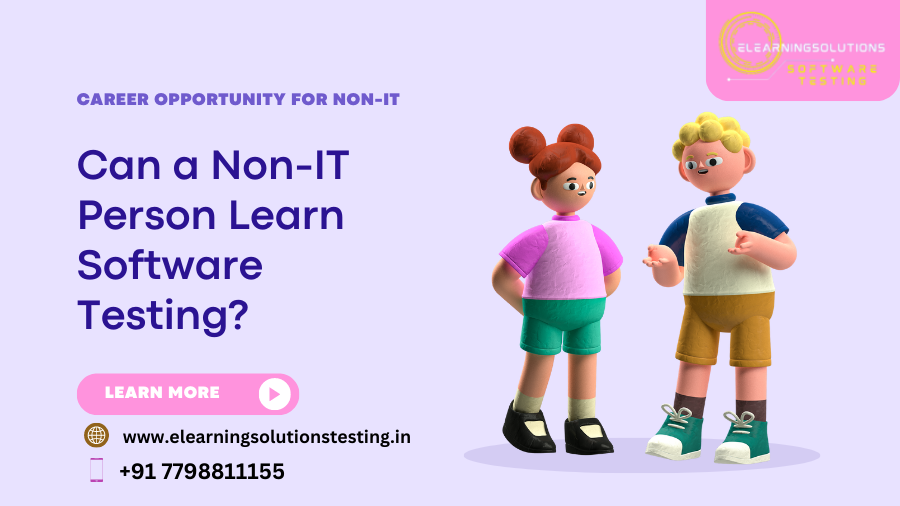Software testing is a crucial aspect of the software development life cycle, ensuring that the final product meets the desired quality standards. While many people believe that software testing is a field exclusively for IT professionals, the truth is that anyone with the right mindset and dedication can learn and excel in software testing. In this article, we will explore the possibilities for non-IT individuals to embark on a journey of learning software testing and discover how they can contribute to the industry. So,Can a Non-IT Person Learn Software Testing? let’s dive in!
Introduction: Understanding Software Testing
Software testing involves the process of evaluating a software application or system to identify defects, errors, or gaps that may affect its functionality or performance. It ensures that the software meets the requirements and works as intended before it is deployed or released to end-users. Software testers play a critical role in this process by executing test cases, analyzing results, and providing valuable feedback to the development team.
The Importance of Software Testing

Software testing is essential for several reasons. It helps identify and fix bugs or issues in the software, enhances the overall quality of the product, reduces the risk of failures or crashes, and improves user satisfaction. In today’s competitive market, where user experience is paramount, robust software testing practices are vital to gain a competitive edge and maintain customer trust.
Transferable Skills for Non-IT Individuals
Non-IT individuals possess valuable transferable skills that can be advantageous in software testing. These skills include strong analytical thinking, attention to detail, problem-solving abilities, effective communication, and the ability to work well in teams. While technical knowledge is undoubtedly beneficial, these non-technical skills can contribute significantly to the testing process.
Learning Resources for Non-IT Individuals

For non-IT individuals aspiring to learn software testing, a variety of learning resources are available. Online tutorials, articles, and books provide a solid foundation in the fundamentals of software testing. It is crucial to gain an understanding of testing methodologies, test case creation, bug tracking, and test automation tools.
Online Courses and Certifications
Taking online courses and obtaining certifications can be a great way for non-IT individuals to enhance their knowledge and skills in software testing. Many reputable platforms offer comprehensive courses that cover various aspects of software testing, including manual testing, automated testing, and performance testing. These courses provide structured learning paths and often include practical exercises and assessments to reinforce understanding.
Practical Application and Experience

To become proficient in software testing, practical application and hands-on experience are essential. Non-IT individuals can start by volunteering for testing tasks within their organizations or participating in open-source projects. This allows them to apply their theoretical knowledge in real-world scenarios, gain practical experience, and build a portfolio that demonstrates their skills to potential employers.
Building a Network and Collaboration Opportunities
Networking and collaboration can open doors to valuable opportunities in the software testing community. Non-IT individuals can join online forums, participate in testing communities, attend conferences or webinars, and connect with experts and professionals in the field. Engaging in discussions, sharing experiences, and seeking guidance from seasoned testers can greatly accelerate the learning process and provide valuable insights into industry best practices.
Challenges Faced by Non-IT Individuals in Software Testing
While non-IT individuals bring unique perspectives and skills to software testing, they may encounter certain challenges along the way. Some of these challenges include:
- Technical Knowledge Gap: Non-IT individuals may initially face a learning curve when it comes to understanding technical concepts and software development processes. However, with dedication and a willingness to learn, they can bridge this knowledge gap over time.
- Familiarity with Testing Tools: Non-IT individuals may have limited exposure to testing tools and frameworks commonly used in the industry. Familiarizing themselves with popular tools such as Selenium, JUnit, or TestNG can greatly enhance their testing capabilities.
- Industry Recognition: Non-IT individuals may face skepticism or lack of recognition from employers or peers who perceive software testing as a purely technical domain. However, by showcasing their skills, knowledge, and dedication, they can overcome these barriers and establish themselves as valuable contributors in the field.
Overcoming Challenges: Tips and Strategies
To overcome the challenges mentioned above, non-IT individuals can employ the following tips and strategies:
- Continuous Learning: Stay updated with the latest trends, tools, and methodologies in software testing. Leverage online resources, attend webinars or workshops, and engage in self-study to expand knowledge and skills.
- Mentorship and Guidance: Seek mentorship from experienced software testers who can provide valuable guidance, advice, and support throughout the learning journey. Join mentorship programs or reach out to professionals in the field for mentorship opportunities.
- Hands-on Practice: Gain practical experience by actively participating in testing projects, whether within your organization or through open-source initiatives. Practice test case creation, bug reporting, and test execution to enhance your skills and build confidence.
- Collaborate and Contribute: Engage with the software testing community through forums, discussion boards, or social media groups. Collaborate with peers, share experiences, and contribute to open-source projects to broaden your network and gain exposure.
- Showcase Your Skills: Build a portfolio that highlights your testing expertise, including any projects or assignments you have worked on. This portfolio can serve as tangible proof of your capabilities and help you stand out when seeking job opportunities.
Advantages of Non-IT Individuals in Software Testing

Non-IT individuals bring unique advantages to the field of software testing, including:
- User Perspective: Non-IT individuals often have a user-centric mindset, enabling them to think from the end-user’s perspective. This perspective helps uncover usability issues and ensures that the software meets user expectations.
- Strong Communication Skills: Effective communication is crucial in software testing, as testers need to articulate their findings, observations, and recommendations to the development team. Non-IT individuals often possess strong communication skills, facilitating clear and concise communication with stakeholders.
- Attention to Detail: Non-IT individuals are often known for their meticulousness and attention to detail. These qualities are highly valuable in software testing, where even minor defects can have significant impacts on the software’s functionality.
- Diverse Backgrounds: Non-IT individuals bring diverse educational and professional backgrounds to the field of software testing. This diversity fosters innovative thinking and problem-solving approaches, leading to improved testing strategies.
The Future of Software Testing
As technology continues to advance, the field of software testing will evolve alongside it. The demand for skilled software testers will remain high, and non-IT individuals can seize this opportunity to contribute to the industry. The future of software testing will likely see increased automation, integration with agile and DevOps practices, and a focus on testing methodologies that ensure efficient and high-quality software development.
To stay relevant in the future of software testing, non-IT individuals can:
- Embrace Automation: Automation is becoming increasingly prevalent in software testing. Non-IT individuals can learn and adapt to test automation frameworks and tools to improve efficiency and productivity in their testing processes.
- Agile and DevOps Adoption: Agile and DevOps methodologies promote collaboration, continuous integration, and frequent releases. Non-IT individuals can familiarize themselves with these approaches and understand how testing fits into the broader development lifecycle.
- Continuous Learning: The field of software testing is ever-evolving, with new technologies and practices emerging regularly. Non-IT individuals should cultivate a mindset of continuous learning and be proactive in expanding their knowledge and skills to stay abreast of industry advancements.
- Specialization and Niche Expertise: As software systems become more complex and diverse, there will be opportunities for non-IT individuals to specialize in specific domains or testing areas. Developing niche expertise can provide a competitive edge and open doors to specialized roles within the software testing field.
In conclusion, Can a Non-IT Person Learn Software Testing? non-IT individuals can certainly learn software testing and contribute meaningfully to the industry. With dedication, continuous learning, and leveraging their unique skills and perspectives, they can excel in this field. Software testing offers exciting career prospects, and non-IT individuals should embrace the opportunity to contribute to the development of high-quality software.
FAQs
- Can a non-IT person become a successful software tester?
Absolutely! While technical knowledge is valuable, non-IT individuals can leverage their transferable skills, dedication to learning, and practical experience to become successful software testers.
- Do I need coding skills to learn software testing?
Coding skills are beneficial but not always mandatory for software testing. Many testing tasks can be performed using manual testing techniques, while automation testing may require some level of coding knowledge.
- What are some recommended online courses for learning software testing?
There are several reputable online platforms that offer courses in software testing, such as Udemy, Coursera, and LinkedIn Learning. Popular courses include “Software Testing Fundamentals” and “Test Automation with Selenium.”
- How can non-IT individuals gain practical experience in software testing?
Non-IT individuals can gain practical experience by volunteering for testing tasks within their organizations, participating in open-source projects, or contributing to testing initiatives in their communities.
- What is the future outlook for software testing careers?
The future outlook for software testing careers is promising. As technology advances and software development practices evolve, the demand for skilled software testers is expected to remain high, providing ample opportunities for growth and career advancement.

